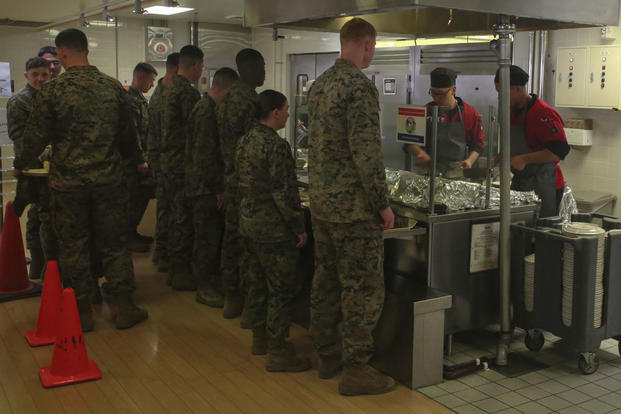Step away from the burger, lance corporal.
In a push to develop a more holistically healthy force, the Marine Corps is creating a Force Fitness Division that will oversee the service's new uniformed fitness instructors, provide resources for sports medicine and injury prevention, and develop nutrition best practices across the Corps.
And this division will also have a say in what's on offer at the chow hall, officials said.
The Corps leads the other military services in fitness, with the lowest percentage of overweight troops, according to Defense Department data obtained by Military Times in 2016. But that doesn't mean the force is eating right and making healthy choices, said Col. Michael Watkins, director of the new Force Fitness Division.
"There's all kinds of great nutrition education out there in terms of nutrition. But there's been a lot of cases where we don't really enforce it," he told reporters at Quantico on Tuesday. "We don't have a consistent theme or haven't had a consistent theme in how we educate Marines in nutrition. It's not that there isn't good information out there, but we haven't had a consistent message and consistent approach to what we teach, and oh by the way, how we enforce it."
The division, he said, is conducting an extensive review of chow hall contracts across the Marine Corps to assess what options are served and how the choices are presented, with attention to color-coding systems and other methods to signal healthy choices on the serving line.
Officials are considering eliminating or limiting chow hall snack lines at entry-level training courses prior to arrival at the fleet.
Once troops arrive at their units, he said, it's much more difficult to control what options Marines have. But nutritional experts are examining ways to reinforce good eating habits. Marine Corps senior dietitian Sharlene Holladay and a team that works with her are reviewing not only what's on offer at chow halls but how Marines eat and what factors may influence their choices.
"[They're] not just looking at the food that's being served, but what are the practices that may impact how long a Marine has to eat -- if it's a heavy training schedule that rushes people through so they can't sit down and consume the meal, or forces them into a bad choice like going through the snack line instead of going through the main line. We're looking at ways we can improve that, almost a Lean Six Sigma kind of approach," Watkins said. "Where can we make improvements so ultimately that Marine gets the nutritional benefit that he should have."
Lean Six Sigma is a corporate performance improvement process that has been used by the Marine Corps in a variety of applications since 2006.
Marine Corps nutrition professionals have also been working to develop a standardized education package to teach Marines about nutrition and the effects of different kinds of food on performance. These training tools will be made available to force fitness instructors in one effort to unify what has previously been a "fragmented, disjointed" approach to fitness training, Watkins said.
Ultimately, officials want to have more than 900 noncommissioned officers serving as fitness instructors, one for every 200 Marines. So far, said Joe Shusko, director of the Corps' new Force Fitness Instructor School, the nutrition package has been very popular with instructors-in-training.
"If there's an hour scheduled just talking about fats, they say, 'No, we want to talk more about it,' because they're not getting it in their schools, they're not getting it in their life," Shusko said. "And we're introducing them to the very basics, and they're like, 'Tell me more, tell me how I can perform better by eating this food versus that.' "
Of course, there's no guarantee that young Marines, many of whom favor a pizza-and-Red-Bull diet, will react as positively to the Corps' reinforced interest in what they're eating. But Watkins said he wants to emphasize moderation, and help Marines learn how to fuel their bodies with performance goals in mind.
"It's not that we're taking all the bad stuff out of the chow hall, but again, it's about encouraging Marines to make good choices and limit the bad stuff," he said.
-- Hope Hodge Seck can be reached at hope.seck@military.com. Follow her on Twitter at @HopeSeck.





























